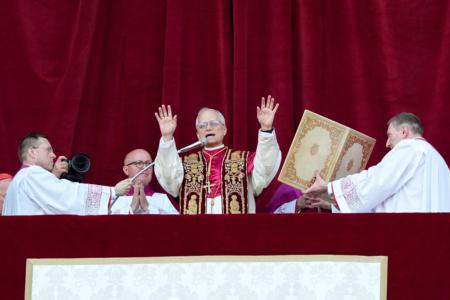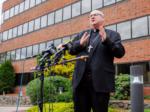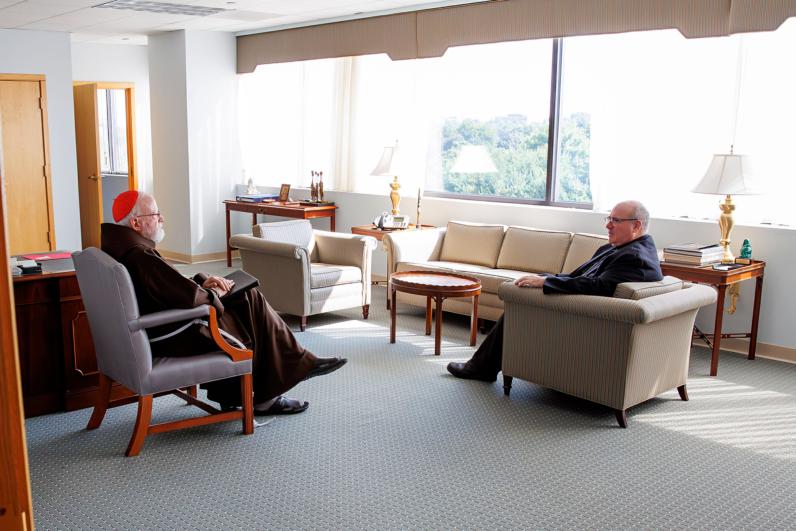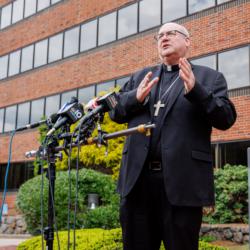What does Archbishop Henning's appointment to Boston mean for the U.S. church?
In one of the most significant U.S. appointments of his pontificate, Pope Francis has given Boston its seventh archbishop. Archbishop Richard G. Henning will take the reins of America's fourth-largest diocese on Oct. 31.
Only a diocesan ordinary for the past 15 months, Archbishop Henning had an approximately year-long apprenticeship as coadjutor of the Diocese of Providence, Rhode Island, under Bishop Thomas J. Tobin, and a handful of years as an auxiliary bishop in his native Diocese of Rockville Centre, New York, where he was ordained in 2018 by Bishop John O. Barres.
As the Rockville Centre native -- who will turn 60 just two weeks before his installation -- begins the transition into one of the most prestigious archdioceses in the country, those who know him say he is an observant listener, quick and intelligent, as well as forward-thinking and faithful. Given his age and Rome's clear vote of confidence in his abilities, Archbishop Henning's new significance could also position him as a leader among a new generation of bishops increasingly taking on more positions of prominence.
The Boston that Archbishop Henning inherits has been led by Cardinal Seán P. O'Malley since 2003, when he began steering an archdiocesan ship that was taking in massive amounts of water following the explosion of an all-consuming sexual abuse crisis uncovered by the Boston Globe. And on that crisis, when questioned at the Aug. 5 press conference that introduced him following his appointment, Archbishop Henning said victim survivors of abuse, many who have left the church, "deserve a listening heart."
"My message to them is I'll listen to their pain, their woundedness," he said, adding that "they often have as much to proclaim to us about the Gospel as we would to them."
The abuse crisis -- which resulted in the early departure of Cardinal O'Malley's predecessor, Cardinal Bernard F. Law -- defined much of Cardinal O'Malley's tenure as he presided over the institutional downsizing required by the legal and financial ramifications of the scandal and exacerbated by the secularization of the culture. But that work is far from over, as local and national trends show. Like many of his fellow bishops, especially in the Northeast and Midwest, Archbishop Henning is sure to face further budget shortfalls; additional mergers and closures of parishes, schools and other ecclesiastical institutions; and continued shortages of priests and religious. To a certain extent, these are issues Archbishop Henning has experienced already.
In 2012, as the dioceses of Rockville Centre and Brooklyn and the Archdiocese of New York merged seminary programs, Archbishop Henning oversaw the closure of Rockville Centre's Seminary of the Immaculate Conception and its transition to a retreat house. The three dioceses also tasked Archbishop Henning to oversee the establishment of an institute for the ongoing formation of clergy. A four-year tenure as an auxiliary bishop of his native diocese, where he was vicar for clergy and pastoral planning, also exposed him to diocesan reorganization necessitated by financial constraints akin to what Boston has experienced.
At the press conference introducing him to his new Boston flock, Archbishop Henning shared that as "a student of history" he knows that "it's not new to (the church) to have upheavals and difficulties." He noted that Catholics must "come to them with that broader perspective" and remember "that ultimately God is in charge -- that we may be sinners, we may make mistakes, but that we trust that God is going to guide his church out of the morass." He added, "I think that's the faith that gives me hope. So my job isn't necessarily to fix everything. It's more a matter of planting those seeds."
In a 2023 interview with Providence NBC affiliate WJAR, Archbishop Henning acknowledged that the church has "to learn to live with fewer resources ... we have to learn to live with less worldly influence." And while aware the church faces a "constellation" of problems, he recognized "Jesus saves the church" amid a secularizing culture in which it "is struggling to evangelize."
While the archbishop seems aware of the need for fresh and creative thinking in order to see that the impact of the church's mission does not fade even while its institutional footprint continues to dwindle, he is now in a position to lead the way for that necessary transformation in ecclesial life. "We are going to have to be a smaller and leaner church, but hopefully that will mean a more zealous and more committed-to-mission church," Archbishop Henning said in the same interview.
In the Aug. 5 press conference, during which Archbishop Henning and Cardinal O'Malley answered questions in English and Spanish side-by-side, Archbishop Henning noted that it's not just the church that is facing upheaval, but "the wider culture in which we live has also, in some sense, lost its way."
"People are searching. They don't know even what to look for," he said. "And I believe that in Jesus Christ we find not just the face of the God who is love, but the model of who we were made to be and called to be as human beings."
"I think the church has something to offer the wider culture in its upheavals as well," he continued. "There's a wisdom, and a compassion, and a commitment to community there that I hope can be meaningful to all of the people of this city, not just the Catholic faith."
Archbishop Henning also seems intent on avoiding the so-called culture wars, particularly regarding reception of holy Communion by pro-abortion politicians.
"I am a pastor, not a politician," he said at the press conference in Boston. In the 2023 WJAR interview, Archbishop Henning had indicated he would likely take a similar, possibly more nuanced approach to Cardinal O'Malley's non-confrontational response to the issue, which came to a head in 2003 when Cardinal O'Malley stated that "a Catholic politician who holds a public, pro-choice position should not be receiving Communion," while adding that "the church presumes that each person is receiving in good faith. It is not our policy to deny Communion. It is up to the individual."
Calling reception of holy Communion "a big deal" warranting preparation "morally and spiritually," Archbishop Henning said "to do so unworthily would be to really place ourselves in harm's way." He described his pastoral style to refrain from publicly humiliating someone who might be "living in a public way that is contrary to Catholic teaching or would be considered sinful." He continued, "You don't humiliate or embarrass the person or make the sacrament itself a source of division. You address an individual with regard to their spiritual life."
Pope Francis and Cardinal Christophe Pierre, the papal ambassador to the U.S. since 2016, have also indicated their desire for bishops with less chancery experience and more parochial background. Archbishop Henning's background includes a focus on academics, having obtained a Roman doctorate in Sacred Scripture and having spent the better part of a decade as a seminary professor in Huntington, New York. Although he never served as a parish pastor -- like his predecessor -- Archbishop Henning had five years of experience as a parochial vicar and helped provide sacramental ministry in parishes during his tenure in seminary formation. He is also fluent in Spanish and Italian.
While Archbishop Henning serves on the U.S. Conference of Catholic Bishops' Committee on Doctrine, the Subcommittee on the Church in Latin America and as the chair of the subcommittee tasked with the translation of sacred Scriptures, he has not as yet been particularly vocal at conference meetings, at least in the public sessions. Pointing to his recent and sudden rise on the U.S. church scene, at least one veteran bishop remarked, upon hearing news of the new archbishop's appointment, "Who's he?"
But maybe that's not necessarily a bad thing? By all accounts, Archbishop Henning is a pastor who keeps his head down and does his job, who doesn't jump to social media to weigh in on the latest cultural brouhaha, and who isn't mastered by ideologies or agendas. To that point, when cornered in the 2023 WJAR interview about whether he's liberal or conservative, Henning said -- echoing a famous line by late Cardinal Francis E. George -- "I don't like that language. I think we have to get past that language of liberal/conservative. It doesn't really fit in the Catholic Church." It's that kind of balanced, non-polarizing, pastoral approach that evidences the appointment's steering by the well-regarded, diplomatically skilled Cardinal Pierre.
As Archbishop Henning prepares to bring a message of reliance and hope in God to the people in his new home, it's noteworthy that he was present and participatory at July's National Eucharistic Congress, in contrast to many of Pope Francis's other high-profile American episcopal appointments to-date.
In his column on the event, Archbishop Henning said he regarded the congress as an "extraordinary gathering ... a beginning and not an end."
"Something happened in Indianapolis that is hard to describe," he wrote. "The witnesses that were offered, the praise of God and the adoration of Our Lord overwhelmed me and so many others with a deep sense of joy, gratitude, and love. On the last night I stood in that throng belting out the songs with tears streaming down my face and knew in my bones that the Spirit was moving in that place."
Archbishop Henning continued his message of hope from the congress, writing, "(The Church has) been through decades of institutional decline and many of us have become tired and discouraged. Take heart, even in the depths of winter God awakens the seeds of spring! God's goodness never fails, and His promises are true. It's time to remember the Lord, to acclaim His Holy Name, and to live His Eucharistic gift. It's time for REVIVAL!"
It is this hope that Archbishop Henning seems poised to bring with him from his short-lived "state of hope" home in Providence to his new home in the Bay State. And while Boston has gained a new archbishop, perhaps the church in America has gained a new leader, too?
- Michael R. Heinlein is author of "Glorifying Christ: The Life of Cardinal Francis E. George, O.M.I." and a promised member of the Association of Pauline Cooperators.



















